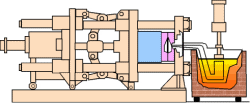Miniature Zinc Die Castings: History and Production. Casting is the process of reproducing an object with the use of a pattern or mold. A material is poured into a mold and then allowed to solidify. This solidified material exactly replicates the patterns in a mold. This replica is called the product. Large amounts of a single object can be replicated by using the casting process. Many products can come out of a single mold. Artists are familiar with casting for creating sculptures, usually made of bronze, sometimes made of plaster. Some of the materials used for a mold in the casting process are sand, plaster, rubber latex, sand-resin mix, or metal. The history of casting is the history of human civilization. We have been using this process for 6000 years. The 1st mention of the methods of casting was in the ancient Sanskrit texts.
Most importantly, the casting process is also well suited in manufacturing industries due to its capacity for mass production. Nowadays, miniature zinc die castings for industrial uses are made in this way. Zinc is the casting material and another stronger metal is fashioned into the mold. This process is called die-casting because the metal mold is also called a die. The zinc, when in its liquid form, is pressure injected into the metal die-mold. When solidified, the zinc then takes the shape and the patterns of its mold. It can now be ejected. The process can be repeated countless times until the metal mold gives out, which can take a long time. In the meantime the manufacturing of the miniature zinc die castings can continue on and on. Tooling machines for die casting include the die-mold, the pressure-injection, and the means for cooling and ejecting the product.


